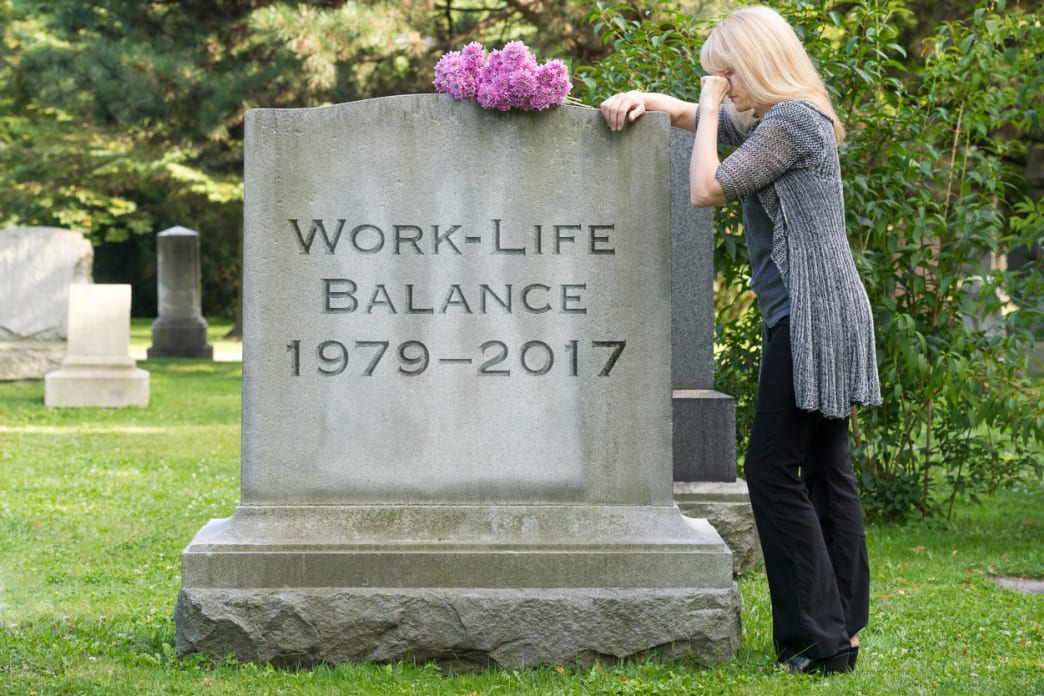
It's dead, but here's how we can honor it.
I am killing off the phrase work-life balance. I am burying it with other terms of days gone by like Y2K and the world wide web. I am striking it from my vocabulary. Why? It doesn’t exist. The phrase, work-life, implies some divide and balance, connotes elements that are equal. Work and life divided equally? Preposterous. There is no such thing as work-life balance, but before you throw your hands up in the air and scream, “I knew it,” let me explain.
The other day, I woke up deprived of a good night’s rest as a result of sleeping with our 6-year-old daughter who I assume was dreaming about wrestling a bear given her flailing and kicking. She often scampers into our room in the dark of night and stealthily slides in between us when we are comatose or too tired to argue. The morning started with my husband ranting about a family collage that our fourth-grader “just forgot” to do. I bounded downstairs just shy of 6 a.m. to rummage through pictures, glue gun in hand, to help him create it. I didn’t get to exercise, took my 8 a.m. call in my pajamas, jumped in the shower and took a 9 a.m. call while commuting to the office. An employee had scheduled a 10 a.m. career development discussion, which was followed by a call from the elementary school clinic. My 11-year-old son was complaining of a headache. They wanted to let me know that they were sending him back to class, but would monitor him. I Googled the Mayo Clinic flu tracker to make sure there wasn’t an outbreak and made a mental note to pick up Children’s Tylenol on my way home.
My focus returned to a client deliverable, but then came a call from my mother’s assisted living community. They want to schedule her for some physical therapy to improve her coordination, which has been on the decline since a massive stroke three years ago. They recommend I call her doctor and get a referral. I make the call, fill out some forms, fax them in and get back to work.
Then, I have a lunch meeting with a team partner during which I get a text from my husband, “Baseball game tonight. Adam is pitching for the first time. We are on the hook to bring snacks.” My husband’s use of “We” means that I will be purchasing bulk-size packs of Goldfish crackers at some point during the day.
On the way back from lunch, my mother calls and we participate in this exchange:
“Hi, Honey, call me when you get a chance.”
“I’m on the phone with you now. You just called me.”
“I really need to talk to you, so buzz when you can.”
“Mom,” I respond, enunciating clearly. “We are on the phone right now. You are talking to me.”
She doesn’t hang up. I can hear the TV in the background, something about scented candles being a great hostess gift. I wait until we are finally disconnected and call her again. She doesn’t pick up. My colleague calls at 4 p.m. He needs something before 6 p.m. I still need to get snacks for the game, commute home, change clothes and make a 7 p.m. game.
Sounds hectic, right? I would be lying if I said it wasn’t. In some way, shape or form, this is what all my days look like, but here’s the realization that I’ve finally come to: This is my life, my hectic, wonderful life. I am a mother of three, a wife, an executive, a sister, a daughter, a volunteer and a friend. I am part of the sandwich generation, juggling the care of both young and old. These are all the roles I play, and bottom line, they cannot be neatly separated. They cannot be compartmentalized. When I walk through the doors at my office, I still have all of these responsibilities. There is no work on one side and life on the other. There is no balance. When I walk into my house at night, I am still an executive at a top-tier firm. Every minute of every day, I am all of these things.
This epiphany has been 20 years in the making and on some level, I commend the corporate world for helping me get there. In general, corporate culture has evolved greatly recognizing employees have a life outside of work. When I started out in management consulting, it was unheard of to come into the office after 8 a.m., and if you wanted to move up the corporate ladder, it was best not to leave before your director or senior manager did. You were to pay your dues even if that meant sitting there two hours after you completed all of your work.
That was the late 90s. In the early 2000s, the concept of supporting the whole employee began to gain some footing. Emphasis was on creating balance, striving for equal parts work and home. Around 2008, came the notion of “disconnecting.” CEOs and human resources offices urged people to disconnect from their laptops and devices.
It was about this time I came to PwC, and I heeded their advice. I would squirrel away my Blackberry when I arrived home only to find myself wondering if my client responded. Like a moth to a flame, I felt drawn to check. To look or not to look. I spent a lot of time and energy trying to achieve some separation. I would try to be “present” on weekends but couldn’t help but brainstorm on my upcoming client pitch. And on occasion during team meetings, I would wonder if the local grocery store could make a Batman cake.
“Be in the moment,” I would think. “Focus!” I tried to balance and disconnect and failed … repeatedly. I fretted about which role had drawn the short end of my responsibility sticks. If I needed to leave before 6 p.m., I would slink out of the office, terrified I would run into a senior executive, sometimes taking the stairs versus the elevator to minimize who might see me.
Here I am in 2017 and after some grey hairs and self-imposed anxiety, I have an announcement. I can’t do it. I cannot separate work and life. It cannot be done and wait for it … my company now knows this and understands. Not only do they understand, they are giving staff the flexibility to deal with this reality. PwC knows life is complicated and has given us permission to adjust through their Flexibilty program. They advocate working smarter and allow people to flex accordingly to meet the demands of their lives. There are still extremely high performance expectations and staff are held accountable, but they have choices about how to structure their lives to meet them.
I offer you an alternative phrase: working life, as in you are working your life, working all your roles. I realize working life doesn’t have much of a ring to it. It is unlikely to be added to the Urban Dictionary. However, it best describes what I’m doing and how most are working.
Several years ago, a colleague told me, “Don’t tell the team you can’t make the meeting because of a childcare issue. Don’t share too much.” I followed this rule for many years, but now I don’t and I’m better for it and so is my team. No longer do I say, “I have to go home and meet a contractor,” when the real truth is that my “contractor” is a 9-year-old boy building a plywood derby car for Boy Scouts. I share details of my life with my team and for the millennial generation who is so used to sharing details of their lives, they expect it. We have a fantastic coaching culture at PwC, but we can’t mentor staff if we don’t know their story … and I mean their whole story, not just the professional one.
So back to the death of work-life balance. Stop fixating on the figurative scales of your life. Stop counter-balancing and measuring who gets what and what gets more. Stop trying to compartmentalize and divide. It is a fruitless exercise. Instead, accept that every day you will be making adjustments in order to accomplish all the roles you fulfill. A little to the left. A little to the right. Up. Down. Sideways. You will never be finished making these adjustments. That’s life.
And to you, the person reading this who says that you don’t want employees with so many life challenges. Ask yourself, do I value diversity of thought? Perspectives? Experiences? I know my clients do. Often the best talent have complicated lives. They bring their whole self to our clients. My experiences as a mother, wife, caretaker, volunteer, have all helped me develop professionally. My time-management skills, negotiation tactics and ability to see the big picture and the details are enhanced by these roles. They help me to be relatable, productive, empathetic and happy. Isn’t that what you want for your employees?
After that hectic day, I got my work done, was late to the baseball game. Wearing my work clothes instead of jeans. And snacks were in the form of a pizza delivered. Perfect? No. My many missions completed. Yes. This is my working life.
There have been countless articles about the convergence of work and life. Lots of discussion, which is a good thing for now. However, my hope is that there comes a time when we stop talking about it because we don’t have to; it’s simply the way we work, the way everyone works. But for us to get there, we need to do the following:
1. Talk about it. Lead the dialogue. Share your stories. Talk about what is going on in your life and let others know what support you need.
2. Don’t judge. Whether someone wants flexibility for their health, their family or an outside interest, don’t evaluate what they are making adjustments for and why they choose to flex. What they value is what they value.
3. Trust and be trusted. Follow through on your commitments. Be responsible. If we are going to get to the next level, managers need to trust their employees to manage their time and get their work done. Employees need to show they can be trusted and not abuse flexibility privileges.
4. Be dependable. Do the things you need to do and do them well. Don’t miss deadlines. Don’t make excuses. You are a grown-up. Act like one and be responsible. Figure it out.
So this is me throwing a figurative rose on the coffin of work-life balance. May you rest in peace.

Julie Teahan is the mother of three, a partner at PwC and an alum of the live reading series, Listen to your Mother (LTYM). She is passionate about empowering individuals to make choices that optimize their personal and professional growth and allow them to live their best life.
Written by Julie Teahan for Working Mother and legally licensed through the Matcha publisher network. Please direct all licensing questions to legal@getmatcha.com.


